Murphy Back To Grab A Bull Run By The Horns At Third Games As Douglass & Smith Pile On Targets
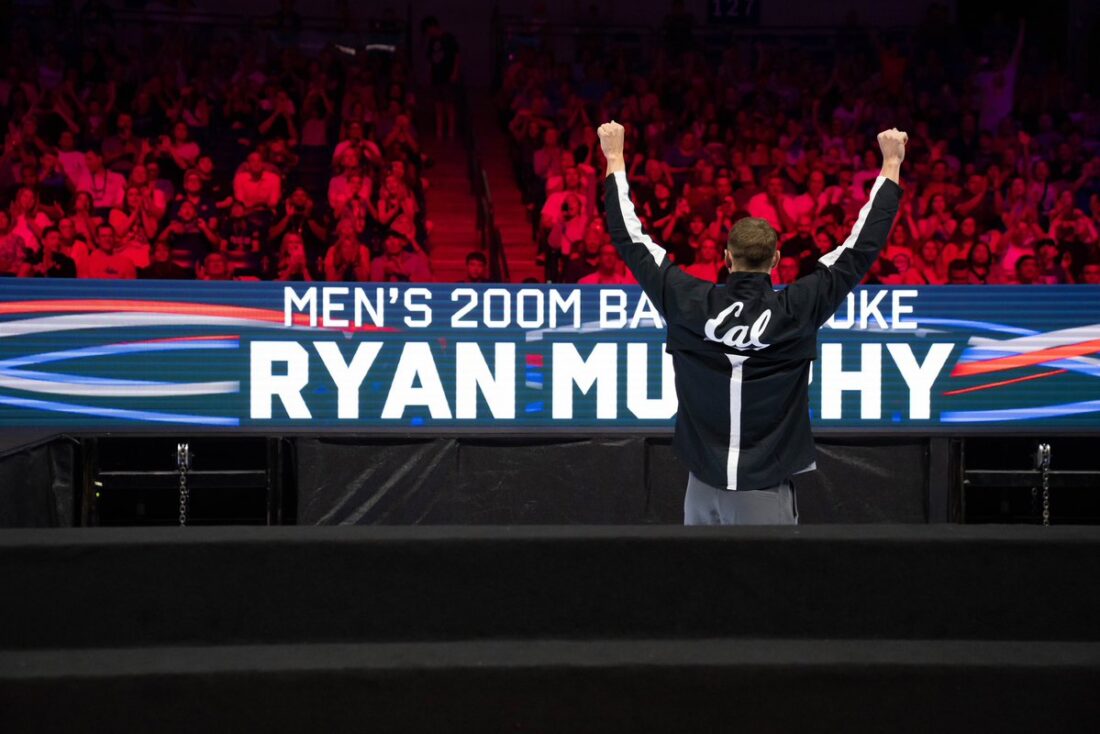
Ryan Murphy will arrive in Paris with a tradition to restore after adding the 200m backstroke to his 100m target for a third successive Games on day 6 at U.S. Trials for the Paris Olympics.
There were fine wins for Kate Douglass, on a Trials record of 2:19.46 in the 200m breaststroke and Olympic silver medallist of Tokyo Regan Smith, on 2:05.60 in the 200m butterfly, as well as a thriller of a 50m freestyle final was built in a cauldron of nine 21sec swims in dash semis that required a swim-off for 8th – but the backdrop of Murphy’s stand held the gaze.
In Indianapolis today, Murphy drew young Cal teammate Keaton Jones to Paris with him in a boiling three-way battle that ended with three men on 1:54s, gold, silver, tickets to Paris and bronze split by 0.45, Jack Aitkens so close yet so far.
Coached by the team led by Dave Durden, Murphy is the experienced hand, Jones the young gun but not ‘the future’, as some keep describing Olympic debutantes. He’s on Team USA. And that’s the Power of Now (see commentary at the foot of this article).
The 200 back battle

Here’s how Murphy sees his mission:
Murphy On A Mission After Tokyo Turmoil
Eight years ago, Murphy became the latest American to land the backstroke double, a third gold secured with a world-record lead-off for the USA in the medley relay.
Then, the American bull run came to a screeching halt in Tokyo three years ago when Evgeny Rylov, with back-up from Team Tchaikovsky mate Kliment Kolesnikov brought to an end a 29-year winning streak for the Stars and Stripes. A European record of 51.98 topped 52.00 for silver, Murphy demoted to bronze in 52.19.
Rylov was the first Russian winner of the crown since the 100m was introduced in 1904, while Barcelona 1992 has been the last time the U.S. missed gold in any men’s backstroke podium, Canada’s Mark Tewksbury taking the 100m, U.S.-based Martin Lopez-Zubero the 200m for hosts Spain.
In Tokyo, Team Tchaikovsky was honoured to the tune of the great composer’s majestic Piano Concerto No. 1, which floated across the waters of a crowd-free Covid-insulated Aquatics Centre with not quite enough beauty to drown out the ugly embarrassment of sanction for Russia’s state-backed doping misdemeanours and organised obfuscation of its cheating.
It would have been the first Olympic swimming gold for a man of Russia since 1996, in the era of Alex Popov and Denis Pankratov. But a man of neutrality was the official line and we couldn’t tell what was on Rylov’s mind back then.
The Borders Keep Shifting Around
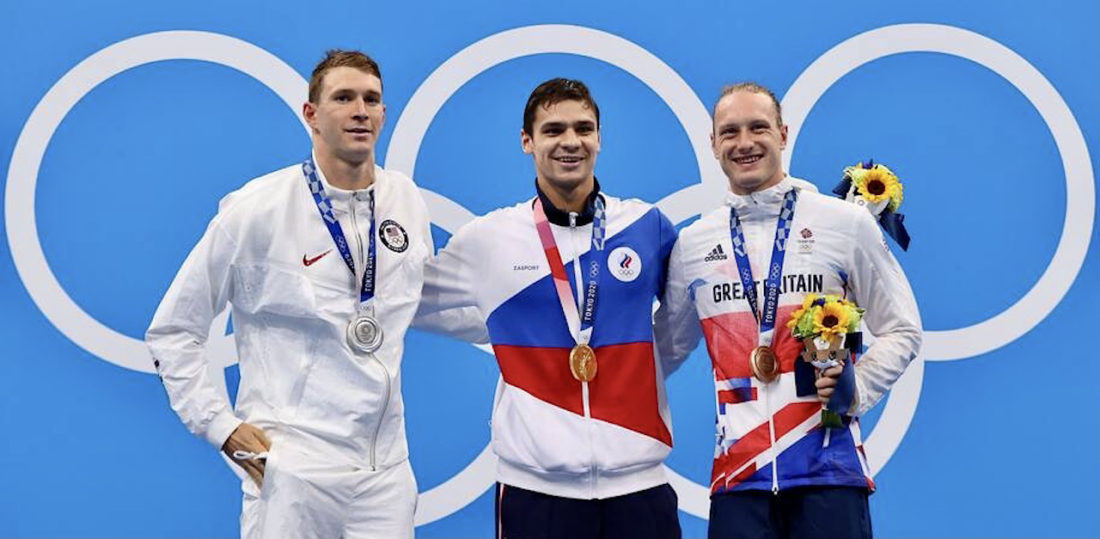
In the 200m, he clocked a 1:53.29 Olympic record to double down on the end of that 29-year bulk run for the USA. Rylov, the first Russian to claim the title since Igor Polianski for the Soviet Union in 1988, was the eighth man in history to claim the double since German Roland Matthes got the club started in 1968 before backing up in 1972, a double-double never since repeated.
It’s ‘borders-keep-shifting-around’ territory: USSR, Unified Team (supposedly neutral), RUS, Team Tchaikovsky (supposedly neutral) – all the same folk, all working under a sports system in which the state is intrinsically linked to the politics and performance of sport. The IOC has yet to accept that – and so the game will go on, Games or no Games for Rylov.
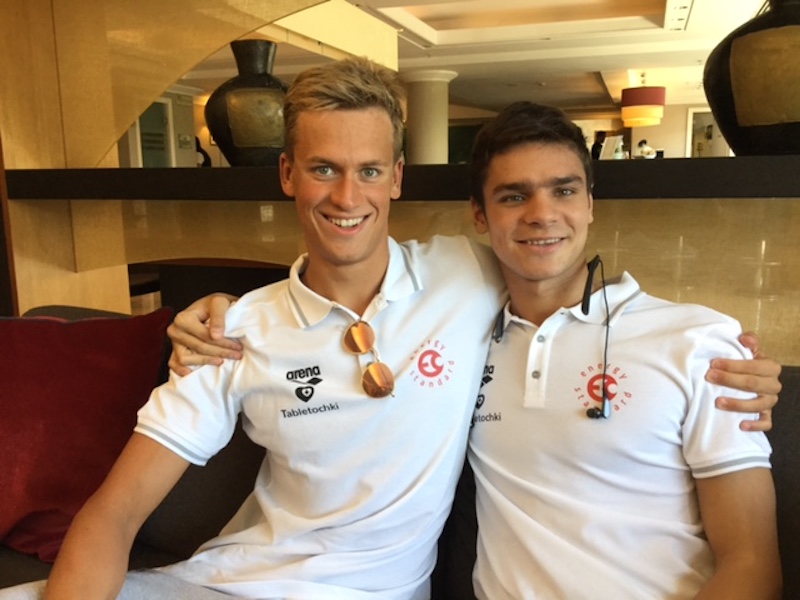
He’s not eligible to be in Paris because he wore a ‘Z’ symbol of war on his kit at a Putin rally in Moscow that saw the Russian President excuse his illegal attacks on a sovereign nation. Rylov appears to like a good double and after the Z affair he criticised the IOC/IF criteria under which Russians can make it to France as neutrals. In short, his support for actions that ended his friendship with Ukrainian one-time international teammate Mykhailo Romanchuk forever.
It’s a tough ask but Murphy now has a second shot at joining Matthes in the double-double club, albeit eight years apart. The Rio king’s trials efforts suggest it’s far from unthinkable.
He would have been the 10th American winner of the 200m in Tokyo but silver it was, Luke Greenbank’s bronze making him Britain’s first 200m backstroke Olympic medallist ever and only the second medal winner in any men’s backstroke race after Herbert Haresnape‘s bronze at London 1908.
It was after the 200m final that Cold War spilled from water to press conference.
Murphy is a ferocious competitor and now heads to his third Games a title contender once more and a captain with an eye on the bigger picture as well as his role in flying the flag.
Douglass Shaves Another Slither Off The Meet Mark
Kate Douglass shaved another 0.2sec off the Trials record with a 2:19.46 win in the 200m breaststroke after a heats time of 2:19.66 started the sandwich that included a 2:21 semi on a day of an unusual double. Douglass is Team USA’s top 100m freestyler, on a mid 52.
In today’s final she was gone to gold from go, more than a second clear at half-way, some 2.5sec ahead at the last turn and all the way home. Lilly King is back for the Games 100-200 double after clawing back a 0.72sec deficit to Alex Walsh down the last length, the 2016 100m Olympic champion’s 36.50 split the fastest in the field. It delivered the Paris silver lining in 2:21.93, Walsh on 2:22.38.

Smith Grabs A Second Solo Target & Sets Up A Third
Olympic silver medallist in Tokyo, Regan Smith, coached by Bob Bowman in Texas (after ASU) took the top 200 ‘fly ticket in 2:05.70 after overhauling Alex Shackell down the last length with a 33.52 homecoming sprint. Shackell’s 34.74 fended off a late challenge from Lindsey Looney (33.39) to grab the second ticket to Paris in 2:06.69 to 2:07.03.

Shackell those makes it two family members on Team USA for Paris in the pool, brother Aaron having made it in the 400m free as a day 1 winner last Saturday:
Smith, who set a world record of 57.13 in the 100m backstroke this week, then checked into lane 4 for the 200m backstroke final tomorrow, her 2:06.41 atop four 2:07s and three 2:08s inside the time it took to claim the intercalated European title over in Belgrade. NB to Portuguese media: celebration is one thing, perspective is something else and writing up a Euro win in such circumstances as a golden shot in Paris is, at best, unfair to the swimmer concerned.
200 Back semis:
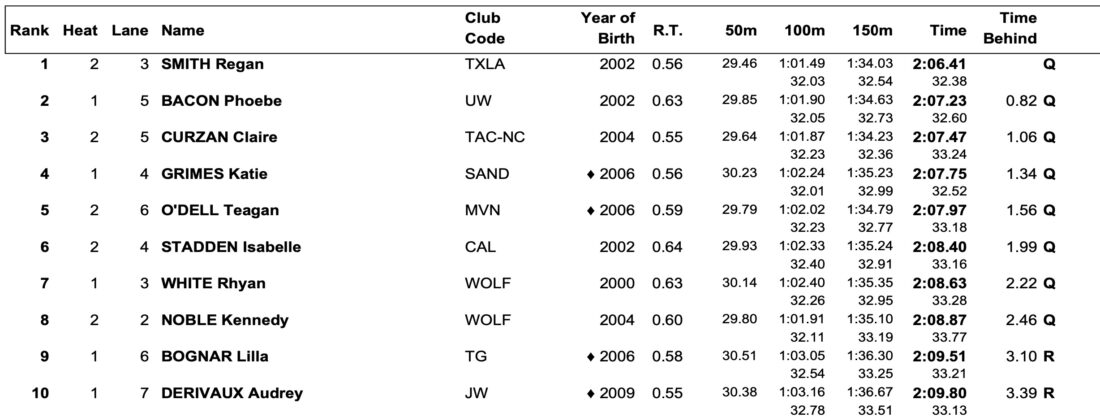
Dressel’s Dash Hopes Alive
Going into Trials, 18 men from non-USA countries had swum inside 22sec so far this year, the top 22 inside 21.89 including four Americans. Nine Americans achieved that sped today in Indianapolis semis, after a swim-off to decide which 21.89 man would go through ended in a second snap in 21.79. Oh, the gift of Lane 9.
In the middle, once more, is Chris Giuliano, on 21.59, Caeleb Dressel threatening in 21.61, Jack Alexy on 21.66. Then came five 21.8s, Ryan Held on 21.82 and Michael Andrew 21.83 after they snapped on 21.7 in heats.
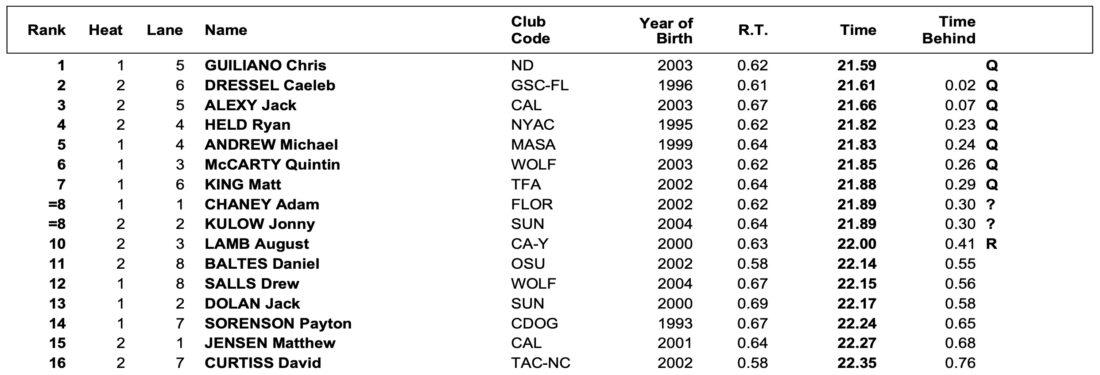

That’s six contenders born 2002-2004, including Giuliano and Alexy, who, like Keaton and others are described as ‘the future’ of USA Swimming. I beg to differ. They’re the Power of Now and better than what sounds more like pre-meditated excuse than hope.
The Power Of Now – Captain Murphy To Young Jones Et Al
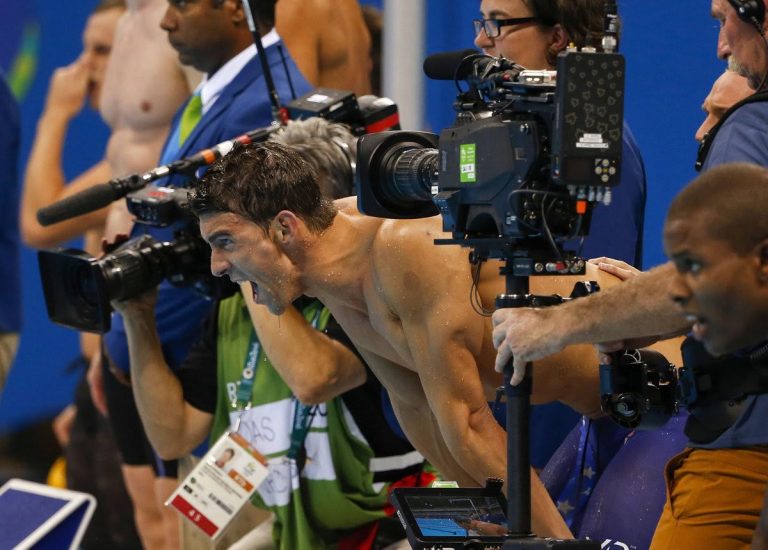
Commentary: The thrill of making a U.S. team and being a podium shot in Stars and Stripes – and yes, most of them are, as ever – is being talked out of existence in some circles, it seems to me as I follow events in the experience and habit of the digital age: from afar.
The power of now and the incomparable thrill of watching great sport live and soaking up the energy of the moment cannot have escaped those lucky enough to be in the crowd in Indianapolis, nor, indeed, those used to covering swimming these days from a bunker far from the water’s edge and when ‘now’ happens get caught in the headlights of rapid delivery, the colour of the ‘now’ stripped from the written word.
In the mix, there’s much talk of ‘the future’. If there’s a meet in the world where a time and place that doesn’t exist is as relevant as a black hole 10 million light years away in a distant corner of the universe to what this day, right here, right now, has to offer, it’s the U.S. Trials.
Imagine looking back in history and saying of Aussie official living legend Shane Gould ‘wow, she’s the future…’. No! She had a future but at 15 in Munich she was the Power of Now! And how! Same for Janet Evans, ’88. She went on to ’92 and ’96 and did a great job for the USA but ’88 was not about the future. It was about ‘now’, right here, flanked by the GDR.
The ‘future’ of U.S. swimming is not for those who have a ticket to the Paris Olympics. Yes, they have a future but their job is right here, right now – and if not, then the powerhouse that was and remains the United States would have lost a gear.
The ‘future’ of USA Swimming is to be found in the likes of a 10th place for Audrey Derivaux, who was born in the year of the Rome shiny suits circus, a year after Michael Phelps eight golds in Beijing, three years before Katie Ledecky claimed her first gold at 15. Derivaux is 14 and clocked 2:09.8 to get within a second of a place in a U.S. Trials final. Worth a line. May all go well for her and her’s.
There are no guarantees but that’s the nature of ‘future’, all to play for, make, break and much in between.
The Paris team includes Thomas Heilman, at 17 the youngest man on the Olympic squad since Phelps made the cut at 15 for Sydney 2000. Heilman made it in the same event, the 200m butterfly. Wonderful. The parallels ought to end there.
Heilman need only look over his shoulder at Luca Urlando to know how heavy the burden of undue expectation can be, how tough the road can be. Phelps is the exception, not the rule – and he’s an exception who offers towering lessons for all in a sport in which the superlative is ten a penny, while the voices calling out the dilution of championship waters – like Doha in February and Belgrade this week – are drowned by a tendency to follow opportunity down a drain.
No-one expects the U.S. to go soft but if the strengths in a system that delivers great depth are obvious and have served the Stars and Stripes so well for generations, then the weaknesses that hold hands with all of that risk not only dilution of the now in each passing wave but the very issues that Michael Phelps has had the courage to raise ever since he retired in 2016 clutching 23 golds and 28 medals in all.
Each story is unique but they also overlap at the edges of the mind and mindset Phelps has described, that which Adam Peaty, Caeleb Dressel, Kristof Milak and many others have also experienced, at least in part when they’ve found themselves forever living in the future of the expectation of others, never taking a moment to appreciate the now, to celebrate the win for what it is in the moment.
It took a big journey and a huge learning curve for swimmer and coach to get to this from Phelps when asked what his comeback goals were: “I’m doing this for me. I’m doing this because I enjoy being in the pool and I enjoy the sport of swimming.” A spectacular Rio swan-song ensued and the rest of life began.
Look up No4 of Bob Bowman’s Golden Rules.
The only thing Heilman needs to know is that he’s the Power of Now on the U.S. team for Paris. He made it. There’s focus and fun to be had. Not when he gets there but every single moment one at a time all the way to the one where he steps up to race in Paris.
Same for Keaton Jones, who leaves his teens behind this year. No idea what wisdom Ryan Murphy will choose to pass on to his younger teammate but I’d bet ‘now’ not ‘Los Angeles 2028’ is where it’s at.
Beyond any and each of those moments at a time is neither here nor there, just like any other future that cannot be written by the light of a crystal ball that reflects the craving of those who seek to predict away the real challenge of ‘now’ with the better, brighter future of what doesn’t exist, tomorrow.
Dickens’ Wilkins Micawber knows them well with his optimistic belief that “something will turn up.” Of course it will but what it looks like is not future tense but all about, as Ekhart Tolle put it in more cosmic terms, the Power of Now.